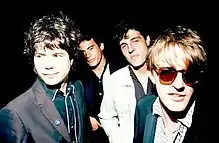The Plimsouls
The Plimsouls are an American rock band formed in Paramount, California in 1978. The band recorded two full-length albums and an EP before splitting up in 1984. Different configurations of the original members have reunited intermittently since.
The Plimsouls | |
|---|---|
 The Plimsouls in the 1980s | |
| Background information | |
| Origin | Paramount, California |
| Genres | Power pop, alternative rock, Paisley Underground, post-punk |
| Years active | 1978–1983, 1995–1998, 2005, 2007 |
| Labels | Beat, Planet, Geffen, Alive Naturalsound, New Rose, Varese |
| Associated acts | The Nerves, the Breakaways |
| Past members | Peter Case Dave Pahoa Louie Ramírez Eddie Muñoz Clem Burke Bryan Head |
History
Formed by singer, songwriter and guitarist Peter Case (who had previously fronted the power pop band the Nerves), the Plimsouls began as a trio in 1978, initially named the Tone Dogs, which included Case, bassist Dave Pahoa, and drummer Lou Ramírez.[1] From inception, the band quickly became a crowd favorite in the Los Angeles club scene. Long Beach promoter Stephen Zepeda signed the group to his Beat Records label for a five-song EP called Zero Hour which was released in 1980.[1] Guitarist Eddie Muñoz joined the group during the recording of the EP.
Danny Holloway produced the Zero Hour EP and managed the group. The song "Zero Hour" received heavy airplay on KROQ-FM, and the Plimsouls grew to be one of the top club draws in the city. Case received critical praise for his songwriting. In 1981, Planet Records signed the group and released their self-titled debut album which Holloway also produced.[1] The single "Now" received strong local airplay in Los Angeles and was also covered by Phil Seymour, appearing on the 2011 CD edition of his second album. Seymour also appeared live with the Plimsouls during the late 1970s, both as a guest vocalist and as an artist on the same bill.
Second album/Valley Girl
The band received some national attention in 1982 when the single "A Million Miles Away" was released on their own Shaky City record label, distributed by Bomp! Records. The song reached No. 11 on the Billboard Top Tracks chart. The song was also featured in the 1983 film Valley Girl.[1] The band also appeared in the film performing the song and parts of two others. The song was included on the band's second album, Everywhere at Once, released by Geffen Records in 1983. "A Million Miles Away" was re-released as a single in 1983 and peaked at No. 82 on the Billboard Hot 100 chart. The band broke up 1984.[2] Several years later, in 1990, a then up-and-coming band named the Goo Goo Dolls covered "A Million Miles Away" on their Hold Me Up album. A re-recorded version of the song is also included on the Speed soundtrack album.[3]
Reunion
Case has continued with a solo career since the band's mid-1980s breakup. In 1996, The Plimsouls, without Ramirez, reunited for a few shows and some recording sessions, resulting in a little-heard reunion album called Kool Trash.[2] This album featured drumming by new band member Clem Burke, who was also simultaneously a member of Blondie. The Plimsouls have continued to reunite occasionally since that time, with Burke being replaced by Bryan Head.
Discography
Studio albums
- The Plimsouls (1981), Planet Records - U.S. No. 153[4]
- Everywhere at Once (1983), Geffen Records - U.S. No. 186[4]
- Kool Trash (1998), Fuel 2000/Shaky City Records
Live albums
- One Night in America (1988)
- Live! Beg, Borrow & Steal, Oct. 1981 (2010)
- Beach Town Confidential (live 1983) (2012)
Singles and EPs
Compilation appearances
- "He Put the Bomp in the Bomp" - Tribute to Greg Shaw CD (2007)
References
- Strong, Martin C. (2003) The Great Indie Discography, Canongate, ISBN 1-84195-335-0, p. 457
- Colin Larkin, ed. (2003). The Virgin Encyclopedia of Eighties Music (Third ed.). Virgin Books. p. 383. ISBN 1-85227-969-9.
- "Speed: Songs From And Inspired By The Motion Picture (Soundtrack)". Amazon.com. Retrieved May 4, 2011.
- Billboard, AllMusic
